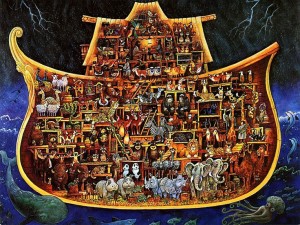by John Holbrook Jr.
A Biblical View, Blog #027 posted January 16, 2017, edited March 9, 2021.
The image of God
At the very beginning of the Bible, the text quotes God as saying, “Let Us make man in Our image, after Our likeness.”[1] Then, in the very next verse, the Bible states, “So God created man in His own image, in the image of God created He him; male and female created he them.”[2] A couple of things leap out of these verses. First, there is an important similarity between God and man. The nature of man is modeled on the nature of God. Second, the pronouns referring to God are both singular and plural and the pronouns referring to man are both singular and plural.
So what does that tell us? Well, in order to understand the makeup of man, we must understand the makeup of God. Moreover, we should be on the alert for an integration of the One and the Many in this makeup of humanity.
The Bible indicates that the Godhead is a tri-unity. It is often called the Trinity. It consists of three distinct persons: the Father, the Son, and the Holy Spirit. Moreover, they did/do different things.
God-the-Father designed Universe and wrote its script, which together form the Decrees of God. Designs and scripts are conceptual entities – products of work on the part of a mind. God-the-Father is somehow associated with the mind.
God-the-Son made Universe and then entered it in the person of Jesus of Nazareth. Jesus was born of a mother, lived, died, rose from the dead, and ascended into heaven – all in bodily form. Universe and Jesus are material entities – products of work on the part of a body. God-the-Son is somehow associated with the body – or corporeality.
God-the-Holy Spirit energized Universe and gives life to its flora and fauna. Energy and life are mysterious entities – products of work on the part of something we do not understand. For the moment, I will say that something is the spirit.
So how do we know that the spirit exists? Everything, with which we are familiar, exhibits concept and actuality, but how do we understand spirit? I think the answer lies in two biblical passages. The first describes the anointing of the disciples by the Holy Spirit on the day of Pentecost:
And when the day of Pentecost was fully come, they were all with one accord in one place. And suddenly there came a sound from heaven as of a rushing mighty wind , and it filled all the house where they were sitting. And there appeared unto them cloven tongues as of fire, and it sat upon each of them. And they were all filled with the Holy Ghost, and began to speak with other tongues, as the Spirit gave them utterance.[3]
Here the spirit is likened to a “rushing mighty wind” and to “cloven tongues of fire.” The second passage describes a portion of the dialogue between Jesus and Nicodemus:
Jesus answered, “Verily, verily, I say unto thee, except a man be born of water and of the Spirit, he cannot enter into the kingdom of God. That which is born of the flesh is flesh; and that which is born of the Spirit is spirit. Marvel not that I said unto thee, ‘Ye must be born again.’ The wind bloweth where it will, and thou hearest the sound thereof, but canst not tell whence it cometh, and whither it goeth: so is every one that is born of the Spirit.[4]
Here too, the spirit is likened to “the wind” and Jesus points out that, like the wind, it cannot be seen, but its effects can be seen, heard, and felt. We can infer the presence of the spirit from its obvious effects. When we see and hear trees being stripped of its leaves and branches, then being brutally torn out of the ground, and finally being driven across the land in a tangle of broken roots and branches, we have no trouble understanding this destruction as one ill effect of a hurricane or tornado, even though we cannot see the wind or discern from whence it came.
Thus the Godhead exhibits an integration of three persons, the effects of whose activities are associated with separate phenomena: mind, body, and spirit.
Just how far does that get us? Well, it tell us that mankind might exhibit a tri-partite nature as well, and the effects of mankind’s activities might be associated with the same separate phenomena: body, mind, and spirit. That is, like God, the individual human might be a tri-unity.
The body
Let’s start with the body – sometimes called flesh and bones. Everyone has a body, and everyone knows that he or she has a body. First, using the five senses – i.e. sight, smell, sound, taste, and touch – I can see, smell, hear, taste, and touch my own body. Second, other people can see, smell, hear, taste, and touch my body. Thus, my body is material. It can be physically examined and measured by me and others. It has an objective reality. Oddly, however, a person actually knows very little about the body which he or she inhabits. Unless a person has studied biology, anatomy, medicine, etc., he or she is remarkably unaware of how the body is constructed or works. Moreover, even medical and scientific professionals have a limited understanding of it; they are discovering something new about it every day. Despite such limited understanding, however, they know that it is the most complex and fascinating object in the known part of Universe. As King David said to God, “…I am fearfully and wonderfully made; marvelous are thy works….” [5]
The mind
Now take the mind – sometimes called the soul or personality. First, the mind is distinct from the body.[6] Second, the mind is not equivalent to the brain. The brain is part of the body. It is the organic mass that resides in the head. It is an incredibly complex system of blood vessels, flesh, nerves, etc. It is material. It can be physically examined and measured. It has an objective reality. The mind, on the other hand, refers to a person’s consciousness and his or her sense of possessing a unique, personal integrity. An unconscious, unknown, and ultimately mysterious process converts information which the brain receives from other parts of the body via nerve signals into the mind’s experience of awareness, concepts, emotions, hunger, intentions, memories, music, perceptions, etc. The mind is immaterial. It cannot be physically examined and measured. It has a subjective reality. Its existence in others can only be inferred by me because they behave like I do.
The spirit
Finally take the spirit. The Bible indicates that it exists independently of the body and the mind.6 Like the mind, it is immaterial. It cannot be physically examined and measured. Unlike the mind, however, it does not have a subjective reality. A person can go through life without being aware of it.
So how do we know that the spirit exists? In light of what we know about God-the-Holy Spirit, we can infer its presence from its obvious effects. It is the vehicle through which God gives every person (a) a rudimentary awareness of God’s existence[7] – whether acknowledged or not – and (b) a rudimentary conscience[8] which distinguishes between good and evil – whether heeded or not. It is also the vehicle through which God gives some people a second birth, after which he and his commandments become the focus of their lives.
Consider the case of Charles ”Chuck” Colson. He served as Special Counsel to President Richard Nixon from 1969 to 1973. He was regarded as Nixon’s hatchet man. He hurt many people, and they and others came to despise him. In the aftermath of the “Watergate Scandal” and Nixon’s resignation from the presidency, however, Colson was suddenly “born again” while reading C.S. Lewis’s Mere Christianity.[9] He underwent a profound change of character and outlook. He publically expressed repentance for his misdeeds and begged forgiveness from the people whom he had hurt. In 1974, he plead guilty to charges of “obstruction of justice” and served seven months in a federal penitentiary. Most important, he began to glorify the Lord in both word and deed, of which the founding of the non-profit Prison Ministry is probably the most famous. Initially many non-Christians questioned his sincerity and accused him of using “religion” as a way both to deflect attention from his misdeeds and to make money. As the years passed, however, and people saw him consistently giving away most of his income to Christian causes and spending all his time and energy serving others, therewith affecting thousands of lives to the good, such criticism died down and eventually went away. What was left was a testimony to the power of the Holy Spirit to affect the spirit of a person and thereby alter the nature and focus of his or her life.
In view of the above, we can say that mankind, like God, exhibits an integration of the One and the Many. First, mankind consists of males and females, who have different natures and different roles to play in the human drama. Men provide for and protect their women and children. Women help their husbands and bear and raise their children. Second, each person is a tri-unity. He or she consists of a mind, which probably reflects the intellect of God-the-Father, a body, which probably reflects the corporeality of God-the-Son, and a spirit, which probably reflects the presence and power of God-the-Holy Spirit. Thus we can understand what God meant when he said, “Let Us make man in Our image, after Our likeness.”
One further point needs to be made. The Bible indicates that every person is born with a tendency to sin, and this sinfulness separates him or her from God. The person is therefore “spiritually dead,” which is why so many people are unaware of the spiritual part of them. Only by accepting the Jewish Messiah, God-the-Son, as Lord and Savior will a person receive “new life” from the God-the-Holy Spirit, who is the Giver of Life. At this point, he or she becomes conscious of the spirit within and tries to follow its leading on the journey of life.
Heed the words of Jesus: “Ye must be born again.”
© 2017 John Holbrook Jr.
_________________________________________
[1] KJ21 Genesis 1:26.
[2] KJ21 Genesis 1:27.
[3] KJ21 Acts 2:1-4.
[4] KJ21. John 3:5-8.
[5] KJ21 Psalm 139:14.
[6] See Matthew 10:28, Acts 2:27,31, 1 Thessalonians 5:23, and Hebrews 4:12.
[7] Romans 2:19-23.
[8] Romans 2:14
[9] The same book which played an important role in my own conversion from atheist to evangelical Christian.




